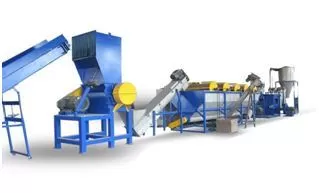In the world of plastic recycling, the challenge isn’t just about breaking down materials; it’s about doing so efficiently, effectively, and sustainably. I, Jacky Zhang, CEO of Amige, stand at the forefront of this challenge. With years of expertise under our belt, we’ve seen firsthand the intricacies of plastic recycling and the pivotal role washing machines play in this process.

So, what machines are indispensable for plastic recycling washing? At its core, plastic recycling washing involves several key pieces of equipment designed to clean, separate, and prepare plastics for reuse. These machines are the unsung heroes in our battle against plastic waste, turning what was once considered trash into valuable resources.
Let’s delve deeper into this topic, exploring the machinery that makes up the backbone of our recycling efforts.
What Role Does the Pre-washing Unit Play?
Pre-washing units are the first step in the recycling chain. They tackle the initial dirt, labels, and other contaminants attached to the plastic waste. This stage is crucial for removing the bulk of the impurities, making the subsequent washing phases more efficient.
How Crucial Are Friction Washers?
Friction washers, on the other hand, use high-speed friction to thoroughly clean the plastic flakes. Imagine them as the workhorses that scrub away the stubborn dirt and grime clinging to the plastic pieces. They’re essential for ensuring the plastic flakes are as clean as possible before moving on to the next stage.
Can Hot Washing Systems Make a Difference?
Indeed, they can! Hot washing systems elevate the cleaning process to a new level by using hot water and detergents to dissolve or wash away remaining contaminants like fats, oils, and some adhesives. This step is vital for obtaining a purity level that meets the high standards required for recycled plastics.
What Is the Role of Sink-Float Separation Tanks?
Following the intense cleaning, sink-float separation tanks come into play. These tanks separate plastics based on density, ensuring different types of plastics can be recycled accordingly. This separation is critical for maintaining the quality of the recycled material.
Why Are Drying Systems Important?
Post-washing, drying systems are imperative. They remove moisture from the cleaned plastic flakes, preparing them for the final steps of recycling. Efficient drying is essential to prevent any quality degradation of the plastic during pelletizing or the manufacturing of new products.
How Do Quality Control and Sorting Technologies Fit In?
Quality control and sorting technologies are the final guardians of the recycling process. They ensure only the highest quality plastic flakes proceed to pelletizing or other downstream processes, using advanced sorting techniques to remove any remaining impurities or non-conforming materials. This step underscores our commitment to quality and sustainability.
Conclusion
As we wrap up, it’s clear that plastic recycling washing is a sophisticated dance of technology, innovation, and dedication. At Amige, we’re proud to be part of this process, contributing our expertise and technology to the global effort of recycling plastics. Through our cutting-edge machinery and relentless pursuit of excellence, we are not just recycling; we are redefining what it means to be sustainable.
That’s our journey through the world of plastic recycling washing. Together, we’re not just solving a problem; we’re creating a future.
I hope this exploration gives you a better understanding of the vital machinery in plastic recycling washing. It’s a complex but rewarding process, and one that we at Amige are deeply passionate about. If you’re looking to make a positive impact on the environment while tackling the challenges of plastic waste, we’re here to guide you every step of the way.
